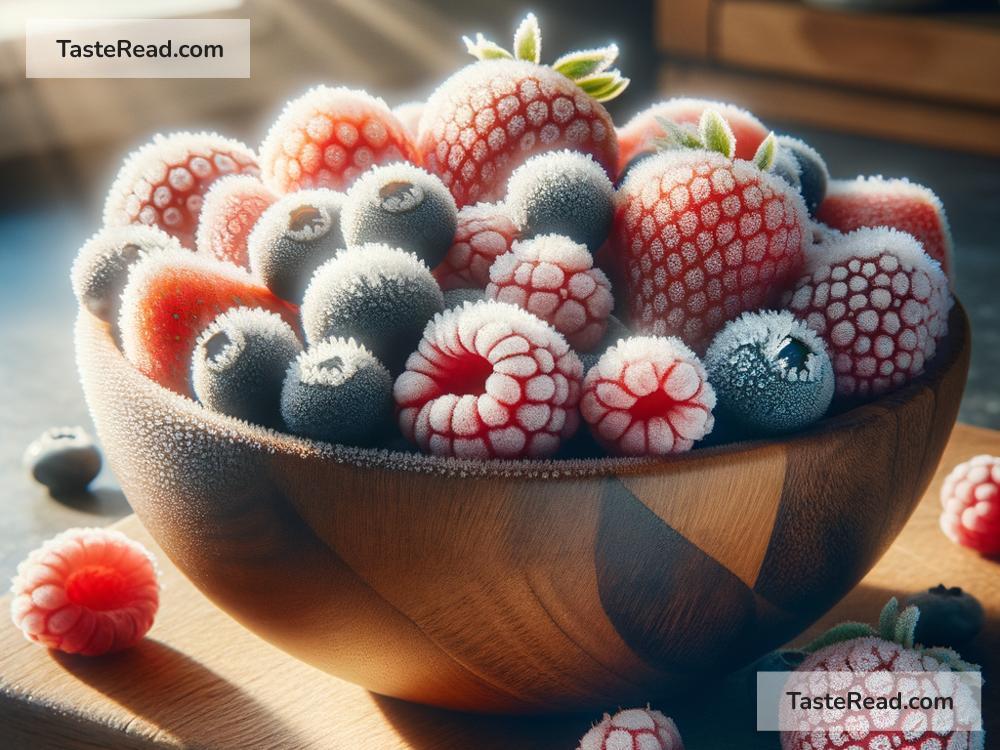How Freezing Impacts the Flavor of Fruits
Freezing is a common way to preserve fruits, whether you’re storing fresh-picked strawberries for later or saving that big batch of mangoes before they go bad. It’s super convenient, keeps food waste low, and allows us to enjoy our favorite fruits year-round—even when they’re out of season. But have you ever noticed that frozen fruits can taste slightly different than fresh ones? Freezing impacts the flavor of fruits in several interesting ways. Let’s break it down simply to understand this process and why your defrosted peaches might not taste quite the same as the ones fresh from the tree.
The Science Behind Freezing
To understand how freezing affects the flavor of fruits, we first need to understand what happens when fruit freezes. Fruits contain a lot of water—sometimes up to 80% or more. This water is spread out in tiny pockets within the fruit’s cells. When you freeze fruit, the water inside these cells turns into ice crystals.
Now, here’s the catch: the size of these ice crystals matters. If you freeze fruit quickly (like in a high-powered freezer designed for food preservation), the ice crystals stay small. But if you freeze fruit slowly, larger ice crystals form. These big ice crystals can poke through the cell walls of the fruit, breaking them open and releasing juices. This is why frozen fruit can often feel softer or mushier after you thaw it—it’s not retaining the same firm texture it had when it was fresh.
This breakdown of the fruit’s structure also has an effect on its flavor and sweetness. Let’s take a closer look.
Fresh vs. Frozen: What Changes?
Freezing doesn’t make fruit “bad,” but it does change some of its qualities, including flavor, texture, and aroma. Here are the main ways freezing impacts fruit:
- Loss of Fresh Aroma
One of the first things you may notice with frozen fruit is that it doesn’t have the vibrant, fresh aroma you get with fresh fruit. The fruity smell you love comes from compounds called volatile aromatics—these give fruit its unique scent and are closely tied to how we perceive its flavor. Freezing can partially dull these aromatic compounds, especially if the fruit stays frozen for a long time.
While frozen fruit retains a lot of its flavor compounds, these aromas don’t “release” as well when the cell structure is damaged during freezing. This is why thawed fruit often doesn’t smell as fragrant or taste as vivid as the fresh version.
- Sweetness May Taste Different
Interestingly, the sweetness of frozen fruit can feel slightly different than fresh fruit. When the ice crystals form and break the fruit’s cells, it releases natural sugars into the juices. As a result, you might notice thawed fruit tastes slightly sweeter or has a more concentrated flavor. For instance, frozen bananas often taste sweeter after thawing because their starches have partially broken down into sugar during storage.
On the flip side, freezing can sometimes tone down the sweetness depending on how long the fruit has been stored and how quickly it was frozen.
- Flavor Can Become Muted During Long Storage
Freezing is excellent for short-term preservation, but if fruit is kept frozen for too long, its flavor can begin to fade. Over time, the cold environment can cause oxidation, even at low temperatures. Oxidation doesn’t spoil the fruit, but it can slowly break down the natural flavors and nutrients. This is why frozen fruit that’s been in the freezer for months might taste a bit bland compared to when you first froze it.
How to Preserve the Best Flavor When Freezing
The good news is that you can take steps to minimize flavor changes and enjoy delicious frozen fruit. Here are some tips:
-
Freeze Quickly and Properly
The faster fruit freezes, the smaller the ice crystals will be. Use a freezer set at the ideal temperature (-18°C or 0°F) and spread fruit pieces out so they chill quickly. If possible, use flash freezing techniques for even better results. -
Use Airtight Packaging
Exposure to air in the freezer can cause freezer burn, which dulls both flavor and texture. To avoid this, store fruit in airtight containers or heavy-duty freezer bags. If you can remove as much air as possible (using a vacuum sealer or pressing out excess air), your fruit will stay tastier. -
Don’t Keep It Too Long
Frozen fruit is best enjoyed within 6–12 months for maximum flavor. While it’s safe to eat beyond that time, the quality—including the taste—starts to decline. Label your frozen fruit with dates to keep track of how long it’s been stored. -
Choose Fruits That Freeze Well
Not all fruits freeze equally well. Berries, bananas, mangoes, and peaches tend to hold their flavor better than water-filled fruits like melons, which often end up tasting bland.
Conclusion
Freezing is a fantastic way to preserve fruits and enjoy them out of season, but it does impact their flavor, texture, and aroma in subtle ways. Ice crystals, oxidation, and long storage periods all play a role in changing the way frozen fruit tastes compared to its fresh counterpart. By freezing fruit quickly, storing it properly, and not keeping it for too long, you can preserve as much of its natural sweetness and flavor as possible.
While the experience of fresh fruit can’t be completely replicated with frozen options, the convenience and versatility offered by frozen fruits make them a staple in many homes. So, next time you pull out frozen fruit to whip up a smoothie, bake a pie, or snack on thawed berries, you’ll better understand why it tastes just a little different—but still delicious!


